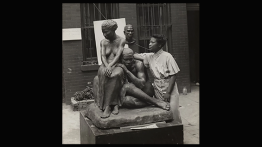The 2023 Cooper Union Augusta Savage Colloquium
Tuesday, October 10, 2023, 6:30 - 8pm

Augusta Savage pictured with her 1938 sculpture titled Realization. Image Courtesy of The New-York Historical Society
The biennial Cooper Union Augusta Savage Colloquium is in honor of the life and work of the artist and educator Augusta Savage A'25. The conference aims to explore the intersections of history, art-praxis, education, and social justice by bringing various scholars and practitioners together for a public conversation.
The Augusta Savage Colloquium invites an art historian or historian to present on a topic relative to the life and/ or legacy of Augusta Savage, directly or indirectly, an established artist or contemporary critic presenting original work on a similar or adjacent topic and an emerging BIPOC artist, art historian, architect or engineer addressing similar issues through their work and/or research.
The 2023 colloquium will include presentations by poet/historian Marilyn Nelson, artist/educator Justin Randolph Thompson, and architect Mabel O. Wilson. Connie H. Choi, curator at The Studio Museum in Harlem, moderates.
Registration required. Please note this free event is first-come-first-served, and an RSVP does not guarantee admission.
Connie H. Choi is curator at The Studio Museum in Harlem, where she oversees the Museum’s collections and is working on projects toward its reopening. Prior to joining the Studio Museum, Choi was the assistant curator of American art at the Brooklyn Museum. She is on the advisory committees of the Andrews-Humphrey Family Foundation and the Shirley Fiterman Art Center at the Borough of Manhattan Community College, and an adjunct professor at Barnard College. Choi has a Ph.D. in art history from Columbia University, an Ed.M. from Harvard University, and a B.A. in the history of art from Yale University.
Marilyn Nelson is the author or translator of more than 20 books and chapbooks for adults and children. Her recent collection of poems, Augusta Savage: The Shape of A Sculptor's Life, reflects on the biography of the Harlem Renaissance artist and trailblazer Augusta Savage. Other critically acclaimed books for young adults include A Wreath for Emmett Till and the groundbreaking Carver: A Life in Poems, a Newbery Honor Book. Of Nelson’s nine poetry collections for adults, The Homeplace won the 1992 Annisfield-Wolf Award; and The Fields of Praise: New and Selected Poems received the 1998 Poets’ Prize, the PEN Winship Award, and the Lenore Marshall Prize. A three-time finalist for the National Book Award, her many other honors include the Frost Medal, the Ruth Lilly Poetry Prize, and the Wallace Stevens Award, and fellowships from the Guggenheim Foundation and the National Endowment for the Arts. A professor emerita of English at the University of Connecticut, she has served as a Chancellor of the Academy of American Poets, the Poet-in-Residence of the Poets' Corner at the Cathedral of St. John the Divine, and the Poet Laureate of Connecticut, 2001– 2006.
Justin Randolph Thompson is an artist, cultural facilitator, and educator based between Italy and the U.S. since 1999. He is co-founder and director of Black History Month Florence, a multi-faceted exploration of Black histories and cultures in the context of Italy; the initiative was recently reframed as a Black cultural center called The Recovery Plan. As an artist engaged in notions of maintenance and re-signifying monuments, Thompson’s most recent project, Surveying Gravity explores the legacy of Randolph Bromery, the artist’s grandfather. The project was born in 2020 when the Fine Arts Center at UMASS announced it would bear Randolf Bromery’s name. Surveying Gravity is a research and performance-based project, engaging the labor of legacy maintenance. Thompson is a recipient of a 2022 Creative Capital Award, a 2020 Italian Council Research Fellowship, a Louis Comfort Tiffany Award, and an Emerging Artist Fellowship from Socrates Sculpture Park amongst others. His work and performances have been exhibited widely in institutions including The Whitney Museum of American Art, the Centro de Arte Reina Sofia, and The American Academy in Rome and are part of numerous collections such as The Studio Museum in Harlem. His life and work seek to deepen the discussions around socio-cultural stratification and the arrogance of permanence by employing fleeting temporary communities as monuments and fostering projects that connect academic discourse, social activism and DIY networking strategies in annual and biennial gathering, sharing and gestures of collectivity.
Mabel O. Wilson is the Nancy and George Rupp Professor of Architecture, Planning and Preservation, a professor in African American and African Diasporic Studies, and the director of the Institute for Research in African American Studies at Columbia University. She has also held appointments at University of California, Berkeley, California College of the Arts, and Princeton University, among others. She is trained in architecture and American Studies, two fields that inform her scholarship, curatorial projects, art works, and design projects. Through her transdisciplinary practice Studio &, Wilson makes visible and legible the ways that anti-Black racism shapes the built environment along with the ways that blackness creates spaces of imagination, refusal and desire. Her research investigates space, politics, and cultural memory in Black America; race and modern architecture; and more.
Located in The Great Hall, in the Foundation Building, 7 East 7th Street, between Third and Fourth Avenues




